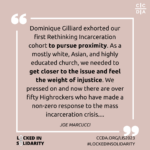Upon returning from several military tours in Iraq, Rev. Paul Abernathy became aware of an alarming fact. He noticed there were higher instances of people affected by trauma in his hometown of Pittsburgh than there were among those he engaged with in a war-torn environment. Understanding that repeated, experienced trauma in the form of hunger, abuse, houselessness, lack of opportunity, racism, lack of health care, and violence was ingrained in his community, Rev. Paul began to ask, “How do you heal an entire community that has been inundated with trauma for generations?”
To answer that question, Rev. Paul and Matthew Walsh (Ph.D., Duquesne University) worked together to plan and host a consultative workshop with community members and stakeholders. This workshop, which was developed around the exploration of community trauma, was hosted in the Hill District in April 2014. The concept of Trauma-Informed Community Development (TICD) emerged as a result of that consultative workshop and the conversations and planning that followed.
The Importance of Trauma-Informed Community Development
As informed by the lived experience of trauma, both personal and collective, TICD establishes and promotes resilient, healing, and healthy communities so that people can be healthy enough to sustain opportunity and realize their potential.
The TICD modules that were developed outline skills, strategies, and tools by which the aforementioned process can be realized. Intensive TICD training hosted by Neighborhood Resilience Project (NRP) is offered regularly. It is the hope that this work inspires a healing movement that transforms a nation and beyond.
In communities that have a disproportionate experience of trauma, trust in public health institutions is, at times, non-existent. NRP has been blessed to serve as a conduit between government aid and beneficiaries. NRP receives a “needs report” from the Department of Human Services during each probing phase for the latest iteration of TICD efforts. TICD efforts are geographically informed by this data; the framework is applied to the highest-need city blocks. Since TICD was implemented on distinct blocks in the Hill District of Pittsburgh, these blocks have seen a reduction in the utilization of social services.
God’s Presence in NRP’s Work
God has revealed himself in many ways as NRP’s ministry has grown. Though the TICD framework was designed with formal applications in mind, it has time and time again proven useful “out of structure”. Father Paul recently engaged with a community member after experiencing car troubles and was well-equipped to serve a new friend, Lloyd.
Fr. Paul’s car wouldn’t start, and Lloyd, a tow truck driver, was deployed to help him. While jumping his battery, Lloyd told Fr. Paul about some of his worries: how he and his wife, Betty, couldn’t afford health insurance and how Betty’s diabetes had long been out of control. Fr. Paul immediately referred them to the Neighborhood Resilience Project’s Free Health Center.
At the Free Health Center, Lloyd was able to get his eyes checked, his glasses prescription renewed, medication prescribed for hyperlipidemia, and free dental care. Gradually, thanks to the medications and insulin, Betty’s blood sugars started coming from the 300s to the 100s. She was provided with a diabetic eye exam, a foot ulcer treatment, and a screening mammogram, all for no charge. Thanks to that mammogram we coordinated for her, lymphatic cancer was discovered at an early stage in her tissues, and she is now receiving treatment that will hopefully help her into remission.
Lloyd and Betty have also blessed the Neighborhood Resilience Project. Their humor and positivity, and their love and commitment to one another, brighten the staff’s day whenever they come in. It was truly a blessed day when Lloyd and Fr. Paul met in the hospital parking lot. In Lloyd’s words, “I’m appreciative of Fr. Paul – him connecting us to you…you don’t leave anybody on the side of the road or alone.”
imHealthy: The Measure of Successful Community Development
Following many successful iterations of micro-community interventions through the TICD framework, a new project to quantify the impact of NRP’s efforts was launched.
After conducting an extensive literature review and finding that there was no integrative health system to analyze resilience, health, and well-being on both a personal and community level, Neighborhood Resilience Project assembled a team of experts, academicians, and community members with lived experience to develop the proprietary web application imHealthy.
Predicated on the trust built by the NRP team members directly reaching individuals in trauma-affected communities, imHealthy is an integrative health assessment system used to understand and improve community and personal well-being.
One of the functions of imHealthy is the Social Network Analysis (SNA) tool. SNA is derived from a nuanced interview conducted with community members and provides us with a graphical means to understand trust and influence and a starting point on which to focus our empowering efforts.
In order to determine the impact of interventions and to determine if people were healthy enough to sustain opportunities, the imHealthy assessment tool was created. imHealthy has three unique functions:
- 1. Tests for health across five domains – biological, psychological, social, spiritual, and relational.
- 2. Provides integrated well-being scores for each person, household, micro-community, and macro-community.
- 3. Offers results immediately.
In each micro-community intervention NRP has conducted, micro-community health has improved as shown by the pre-assessment and post-assessment imHealthy metrics.
Join the Movement
Neighborhood Resilience Project offers Trauma-Informed Community Development intensive training. To learn more, contact us or visit our booth at the upcoming CCDA conference in Portland!
We ask for the Lord to bless the ministries of all CCDA members and pray that we are given strength to offer support, care, and hope. We pray that the light of Christ shines through us onto those to whom we serve.
About Nick Goussetis

Nick Goussetis is the National Growth Manager at the Neighborhood Resilience Project, an Orthodox Christian nonprofit focusing on building resilient, healing, and healthy communities. A Penn State alum with supply chain experience across several Fortune 500 firms and a youth-facing leadership development background, Nick engages public and private stakeholders to support the achievement of significant impact across diverse communities. In his current role, Nick works with groups throughout the nation to advance innovative trauma-informed community development strategies in their own neighborhoods.



